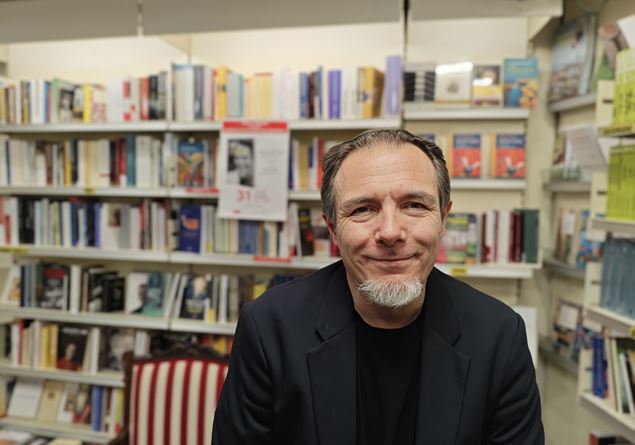by Sergio Casali
Polyglot, cosmopolitan, violin teacher, enthusiastic about character and aso comfortable with i social media. Haim Cipriani, Genoese, is a rabbi that has the roots of his teaching in the Italian and chassid tradition. Deeply imbued with biblical culture, he chose to practice “without walls” Judaism by being on the most complex borders of contemporary. With Famiglia Cristiana he agrees to talk about his community, the most sensitive issues of bioethics, the role of faith in the world of globalization. We do it in the San Paolo library of the Ligurian capital at the presentation of his book “Rabbi, can I ask you a question?” (Claudiana, 144 pages, 14.50 euros), an anthology of the questions he received in ten years of rabbed “from the most varied people and in the most unthinkable places: at the bar, during the conferences, walking on the street”. His community Etz Haim has joined the conservative movement – halfway between orthodoxy and Jewish reform – which tries to remain faithful to the Torah and at the whole of the legal rules of the traditional Jewish doctrine collected in theHalakah without giving up the responsibility to answer the questions of contemporary history and culture. Because, as explained by smiling Raffaella Petraroli Luzzati, the president of the Jewish community of Genoa who introduced the presentation: “Where there are two Jews, there are three opinions”.
Rav Cipriani, his is a community that self -reflects “without walls”
I started fifteen years ago, keeping on-line courses when nobody still did them. Then over time, to respond to the requests that came to me, I trained this group that went beyond the commitment of the study and wanted to make communities. In a short time we have collected people from all over Italy with meetings in presence, without even interrupting the connections remotely. We are a hundred members and we meet once a week. The opening is not only in the methods of meeting, but above all in the absence of barriers towards non -Jewish presences which are numerous, about half of the members. There are also ministers of worship: we had priests, nuns, Protestant shepherds.
A commitment that also serves to attract the youngest
Above all, we do a great job to try to recover the children of Jewish families who are moving away from the faith of their family or to welcome many people of Jewish origin, perhaps of different generations ago, who want to return to take possession of their roots and who sometimes have difficulty doing it in other areas.
Is there no risk of wating the identity of Judaism?
Meanwhile, it must be recognized that in a contemporary society the walls simply no longer work: everything passes through a reasonable degree of hybridization. Looking for purity at all costs is unrealistic, it would be like raising a child holding it under a glass bell. Rather, we men of faith must learn to go out, take the risks of the case, prepare ourselves with a strong identity, knowledge, consciousness and make sure that this leads to the encounter with the other. Without fear that things change us, because life is also to change, but without losing control of changes. Is there a danger of dilution? Yes, there are a thousand dangers, but life is a dangerous stuff: a lot of people dies.
In the book he speaks of delicate and very current themes. What is its position on surrogate motherhood?
Biblical tradition generally leads to not recommend it. We are very supporting the desire for motherhood and paternity, and we support the possibilities that science creates to help couples, but Judaism gives priority adoption. Surrogate motherhood has a very serious ethical problem linked to the exploitation of the female body and economic disparities, but also to the possibility of serious emotional imbalances for the pregnant woman.
And on the end of life?
Judaism has always been the problem of safeguarding human existence and its quality: it is never a life at all costs. It prohibits the voluntary interruption of life, but also in the Talmud we read about situations in which we choose to stop the means that prolong life artificially, in order not to excessively solicit the dying. Certainly there is a ban on the therapeutic fury, but not a sympathy for active euthanasia, aware of how often the shades are very thin. The basic position remains for which the suffering itself is never seen as a merit: it is part of human existence, but it must be relieved and abbreviated as much as possible
In your community you make a boast of giving an important space to women
Giving a greater space to women in religions is possible and it is necessary. And this today also exists in a certain orthodoxy – even if minority – which in some situations has made the female rabbed possible. The equal dignity of genres, equality in worship are now reality in Judaism. It is something that is making room in contemporary consciousness, so you simply cannot deprive yourself of the presence of a certain type of female presence, relegating women to certain secondary roles. And a similar speech is valid for LGBT people.
In what sense?
The presence of homosexual orientation people is not new, but the world welcomes it in a new way because they can no longer be refused. The first step is to not ignore them, because indifference is always the worst thing that can be addressed to human beings. But they cannot even be refused, even for a theological reason: they are people and if a divinity has created human beings with a different affection there must be a purpose and we must help them discover this purpose.
However, it is undeniable that the positions of ancient Judaism were much more severe on this point.
At the basis of the ancient prohibition of homosexuality, there was the fact that it was often based on power and it was also a form of idolatry, that is, on the form of submission of some by others. This is in fact not acceptable. But when it becomes a way of being that is inscribed in an emotional normality, it must be accepted without any problem. On the contrary, we must fight with whom these problems creates them, often generating enormous suffering.
Another trait of the contemporary world is exasperated individualism. Do religions still have something to say to contrast it?
One of the anti -idolatric attitudes of Judaism turns against the dictatorship of the individual. The myth of the strong man does not exist in the Bible, but the affirmation that only in a group can be saved, so much so that even Abraham is asked to find ten right men. Companies do not change thanks to individuals, but when people learn to put together, to form a group, to be a community. This is something on which traditions of faith still have a lot to say.








